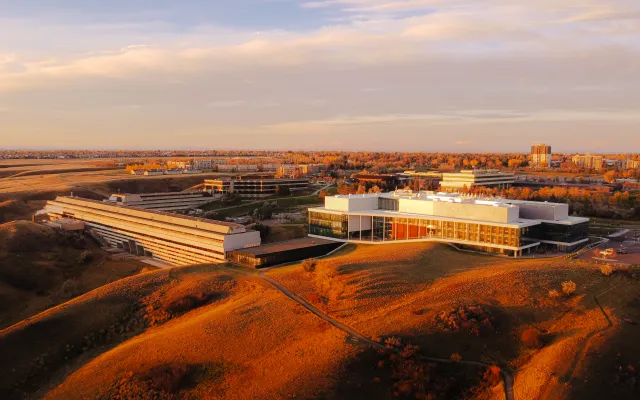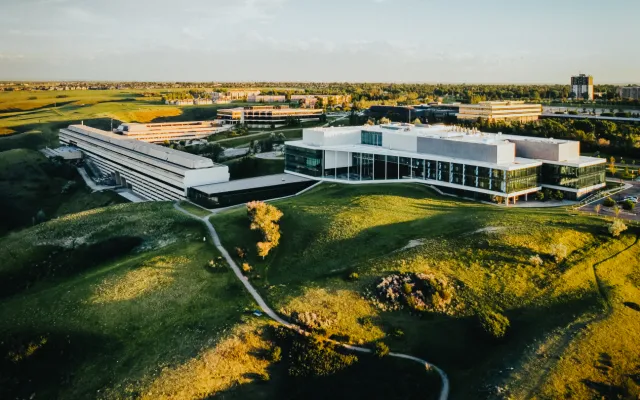Curricular Work-Integrated/Experiential Learning Reporting Initiative
Enhancing Student Experiences
Send Us an Email
Project Overview:
At the University of Lethbridge, we are committed to enriching the student experience and expanding access to experiential learning opportunities. In alignment with this ongoing commitment and the provincial government's emphasis on work-integrated learning (WIL) as a key accountability metric, Career Bridge and the Advisory Committee for Work-Integrated Learning and Career Development (ACWILCD) are collaborating on a comprehensive reporting initiative to improve data capture and reporting of curricular work-integrated and course-based experiential learning opportunities across our campus.
Why Do This?
This initiative will serve as a solution for capturing information about curricular experiential learning that occurs within academic programs and courses. By doing so, we can ensure accurate reporting to the government when and where required.
Through this proactive approach, we also reinforce our dedication to providing students with a comprehensive liberal education. Additionally, this information will be used to assist faculty and staff with quality WIL and CBEL program or course design.
Project Benefits:
Institutional Advantages
- Supports achievement of future enrolment targets and funding objectives
- Demonstrates ULethbridge's leadership in Work-Integrated Learning (WIL) and Course-Based Experiential Learning (CBEL) in Alberta and nationally
- Supports quality in WIL and CBEL pedagogy
- Drives engagement in experiential learning research and community and industry collaboration
Student Empowerment
- Enables simple identification of courses with experiential learning components via the timetable
- Provides a comprehensive, institutionally validated record of curricular experiences and acquired competencies on the MyExperience Transcript (MET)
- Supports alignment with the four-pillar approach to Liberal Education
Essential Project Definitions:
is an interdisciplinary, educational philosophy and practice that promotes academic learning outcomes, student career development and critical thinking. By participating in intentionally designed, authentic learning experiences and guided reflection, EL opportunities are created for students to further develop a wide range of knowledge, skills and values while inspiring them to make meaningful choices about their career path (from the Experiential Learning Toolkit Canada).
is a form of curricular experiential education that formally integrates a student’s academic studies with quality experiences within a workplace or practice setting. WIL experiences include an engaged partnership of at least: an academic institution, a host organization, and a student. WIL can occur at the course or program level and includes the development of student learning objectives and outcomes related to: employability, agency, knowledge and skill mobility and life-long learning (taken from CEWIL 2024).
A form of academic/curricular experiential learning (EL); academic courses which include an embedded experiential learning component as part of the course design and/or curriculum, often complimenting other educational components such as lectures or presentations. Learning outcomes may be related to employability skills but do not necessarily involve 3rd party engagement.
Is an institutionally validated record identifying a student's professional and personal experiences at the University of Lethbridge. The MET also encourages students to develop and identify crucial employability skills and transferable competencies that complement their academic transcript. Learn more
Does My Course Demonstrate WIL?
Use the following definitions table to:
1. determine if your course &/or its components qualify as a WIL "type" (as per the national standard *CEWIL Canada)
2. identify the specific type of WIL (select best-fit)
*Remember, work-integrated learning courses require a host organization, an institutional partner, and a student. Reflective practice is required as a pedagogical component.
| Course Code | Title | Official Description: (from CEWIL 2024) |
|---|---|---|
| COOPE | Co-operative Education | Co-operative education consists of alternating academic terms and paid work terms. Co-operative education internship models consist of several co-op work terms back-to-back. In both models, work terms provide experience in a workplace setting related to the student’s field of study. The number of required work terms varies by program; however, the time spent in work terms must be at least 30 per cent of the time spent in academic study for programs over two years in length and 25 per cent of time for programs two years and shorter in length |
| INTER | Internship | Internship consists of one discipline specific (typically full-time), supervised, structured, paid or unpaid, practice placement. Internships may occur in the middle of an academic program or after all academic coursework has been completed and prior to graduation. Internships can be of any length, but are typically 12 to 16 months long. |
| SERVL | Service Learning | Service learning integrates meaningful community service with classroom instruction and critical reflection to enrich the learning experience and strengthen communities. In practice, students work in partnership with a community-based organization to apply their disciplinary knowledge to a challenge identified by the community. |
| FIELP | Field Placement | Field placement provides students with an intensive part-time/short-term hands-on practical experience in a setting relevant to their subject of study. Field placements may not require supervision of a registered or licensed professional and the completed work experience hours are not required for professional certification. |
| CLINP | Mandatory Clinical Practicum Placement | Mandatory clinical placement involves work experience under the supervision of an experienced registered or licensed professional (e.g., preceptor) in any discipline that requires practice-based work experience for professional licensure or certification. Practicums are generally unpaid and, as the work is done in a supervised setting, typically students do not have their own workload/caseload. |
| APPLR | Applied Research | Students are engaged in research that occurs primarily in workplaces, includes consulting projects, design projects, community-based research projects. |
| ENTRE | Entrepreneurship | Allows a student to leverage resources, space, mentorship and/or funding to engage in the early stage development of business start-ups and/or to advance external ideas that address real-world needs for academic credit. |
| WORKE | Work Experience | Intersperses one or two work terms (typically full-time) into an academic program, where work terms provide experience in a workplace setting related to the student’s field of study and/or career goals. |
Institutional Examples & Considerations
Does My Course Demonstrate CBEL?
Use the following definitions table to determine if:
1. your course &/or its components qualify as Course-Based Experiential Learning (as per the Experiential Learning Toolkit Characteristics of EL - Google Docs)
2. identify the specific type of CBEL (select best-fit)
*Remember, CBEL requires reflective practice as a pedagogical component.
| Course Code | Title | Official Description: (from CBEL Course Codes 2024) |
|---|---|---|
| INSIM | Interactive Simulation | Dynamic case study of a particular social or physical reality, in which students take on roles with well-defined responsibilities and constraints in order to reach a goal |
| LABEX | Lab Experience | First-hand experience in observation and manipulation of the materials of science to develop understanding and appreciation. Laboratory training is also frequently used to develop skills necessary for more advanced study or research. |
| PBCWK | Project-Based Course Work | Any programmatic or instructional approach that utilizes multifaceted projects as a central organizing strategy for educating students. When engaged in project-based learning, students will typically be assigned a project or series of projects that require them to use diverse skills—such as researching, writing, interviewing, collaborating, or public speaking—to produce various work products, such as research papers, scientific studies, public-policy proposals, multimedia presentations, video documentaries, art installations, or musical and theatrical performances, for example. |
| FIELE | Field Experience | An opportunity to apply knowledge gained in the classroom with intensive hands-on practical and supervised experience in a setting relevant to their subject of study. |
| PERBL | Performance-Based Learning | Opportunities that allow students to participate in, oversee, or facilitate artistic, dramatic, or musical performances or exhibitions. |
| INCUB | Incubator | Specially designed programs to help young start-ups innovate and grow |
Institutional Examples & Considerations
Learn More About the Project:

Reporting Project Specifics
Learn more about how the project intends to identify & define WIL/CBEL activities for the purpose of the report

Reporting Project Eligibility
Review if your class, activity, lab, etc... meet the basic conditions for project eligibility
